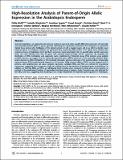| dc.contributor.author | Donoghue, Mark T. A. | |
| dc.contributor.author | Spillane, Charles | |
| dc.date.accessioned | 2012-04-30T17:13:52Z | |
| dc.date.available | 2012-04-30T17:13:52Z | |
| dc.date.issued | 2011 | |
| dc.identifier.citation | Wolff, P,Weinhofer, I,Seguin, J,Roszak, P,Beisel, C,Donoghue, MTA,Spillane, C,Nordborg, M,Rehmsmeier, M,Kohler, C (2011) High-resolution analysis of parent-of-origin allelic expression in the Arabidopsis endosperm. Plos Genetics, 7 . | en_US |
| dc.identifier.uri | http://hdl.handle.net/10379/2706 | |
| dc.description.abstract | Genomic imprinting is an epigenetic phenomenon leading to parent-of-origin specific differential expression of maternally and paternally inherited alleles. In plants, genomic imprinting has mainly been observed in the endosperm, an ephemeral triploid tissue derived after fertilization of the diploid central cell with a haploid sperm cell. In an effort to identify novel imprinted genes in Arabidopsis thaliana, we generated deep sequencing RNA profiles of F1 hybrid seeds derived after reciprocal crosses of Arabidopsis Col-0 and Bur-0 accessions. Using polymorphic sites to quantify allele-specific expression levels, we could identify more than 60 genes with potential parent-of-origin specific expression. By analyzing the distribution of DNA methylation and epigenetic marks established by Polycomb group (PcG) proteins using publicly available datasets, we suggest that for maternally expressed genes (MEGs) repression of the paternally inherited alleles largely depends on DNA methylation or PcG-mediated repression, whereas repression of the maternal alleles of paternally expressed genes (PEGs) predominantly depends on PcG proteins. While maternal alleles of MEGs are also targeted by PcG proteins, such targeting does not cause complete repression. Candidate MEGs and PEGs are enriched for cis-proximal transposons, suggesting that transposons might be a driving force for the evolution of imprinted genes in Arabidopsis. In addition, we find that MEGs and PEGs are significantly faster evolving when compared to other genes in the genome. In contrast to the predominant location of mammalian imprinted genes in clusters, cluster formation was only detected for few MEGs and PEGs, suggesting that clustering is not a major requirement for imprinted gene regulation in Arabidopsis. | en_US |
| dc.format | application/pdf | en_US |
| dc.language.iso | en | en_US |
| dc.relation.ispartof | Plos Genetics | en |
| dc.rights | Attribution-NonCommercial-NoDerivs 3.0 Ireland | |
| dc.rights.uri | https://creativecommons.org/licenses/by-nc-nd/3.0/ie/ | |
| dc.subject | DNA METHYLATION | en_US |
| dc.subject | SEED DEVELOPMENT | en_US |
| dc.subject | POLYCOMB GENE | en_US |
| dc.subject | TRANSPOSABLE ELEMENTS | en_US |
| dc.subject | TRANSCRIPTION FACTORS | en_US |
| dc.subject | FEMALE GAMETOPHYTE | en_US |
| dc.subject | TANDEM REPEATS | en_US |
| dc.subject | DOMAIN PROTEIN | en_US |
| dc.subject | IMPRINTED GENE | en_US |
| dc.subject | MEDEA LOCUS | en_US |
| dc.title | High-resolution analysis of parent-of-origin allelic expression in the Arabidopsis endosperm. | en_US |
| dc.type | Article | en_US |
| dc.date.updated | 2012-04-30T17:08:06Z | |
| dc.identifier.doi | ARTN e1002126 | |
| dc.description.peer-reviewed | peer-reviewed | |
| dc.contributor.funder | |~| | |
| dc.internal.rssid | 1051796 | |
| dc.local.contact | Charles Spillane, Botany, School Of Natural Sciences, Nui Galway. Email: charles.spillane@nuigalway.ie | |
| dc.local.copyrightchecked | Yes | |
| dc.local.version | ACCEPTED | |
| nui.item.downloads | 293 | |


